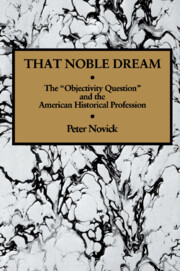Book contents
- Frontmatter
- Contents
- Preface
- Introduction: Nailing jelly to the wall
- I Objectivity enthroned
- II Objectivity besieged
- 5 Historians on the home front
- 6 A changed climate
- 7 Professionalism stalled
- 8 Divergence and dissent
- 9 The battle joined
- III Objectivity reconstructed
- IV Objectivity in crisis
- Appendix: Manuscript collections cited
- Index
- Frontmatter
- Contents
- Preface
- Introduction: Nailing jelly to the wall
- I Objectivity enthroned
- II Objectivity besieged
- 5 Historians on the home front
- 6 A changed climate
- 7 Professionalism stalled
- 8 Divergence and dissent
- 9 The battle joined
- III Objectivity reconstructed
- IV Objectivity in crisis
- Appendix: Manuscript collections cited
- Index
Summary
As cultural historians multiply, cultural epochs get cut finer and finer: where we once had the Age of the Baroque and the Siècle des Lumières, we now have characterizations of the culture of decades: “iconoclasm” for the 1920s; “radicalism” for the 1930s. But there was no shortage of superstition in the Age of Reason; plenty of traditionalism and complacency in the decades of iconoclasm and radicalism. It is almost always a minority who reflect and embody these “defining” currents. And this is particularly true when looking at the relationship of the professorate to the Zeitgeist. If, in hostile caricature, the archetypical intellectual goes whoring after every new current in thought and culture, no matter how shabby and evanescent, the archetypical academic ignores every new current, no matter how profound and substantial. (To succumb to such siren songs is to be “trendy,” to cast doubt on one's “soundness.”) In any event, we are concerned here with a heterodox minority of the historical profession—with the way in which they responded to aspects of interwar culture.
“Historical relativists” never presented either an overall philosophy or a positive program for historiography. Rather they offered a series of criticisms of the traditional posture of objectivity, and some suggestions as to how historians might proceed in the face of what they saw as the collapse of the profession's founding myth. In considering the intellectual origins of the relativist critique, I would suggest, as have many others before me in other arenas, Claude Lévi-Strauss's metaphor of bricolage.
- Type
- Chapter
- Information
- That Noble DreamThe 'Objectivity Question' and the American Historical Profession, pp. 133 - 167Publisher: Cambridge University PressPrint publication year: 1988

